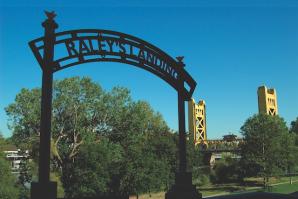There is nobody more bullish on the City of West Sacramento than Mayor Chris Cabaldon. He says no city in the region can boast of a better location and, perhaps most importantly, a better water supply. With these two key attributes, the mayor believes the west-bank city is well positioned to attract business, jobs and residents for the foreseeable future.
“Twenty five years ago, after many failures, city incorporation finally passed for three main reasons: There was no damn place to shop in town, we had a river on both sides of the city with no access other than a boat ramp and, finally, we had a water supply you could not see through. All three issues have been successfully addressed.”
“Since becoming a city, the council has done a great job of securing long-term water rights. A lot of attention was also paid to upgrading water infrastructure, including the completion of our new state-of-the-art water purifying plant. We have layers and layers of water rights agreements. Of course, nothing is 100 percent certain.”
“Our water supply is designed to accommodate the city’s total residential and business buildout. Depending on what forecast you look at, the city will grow to between 95,000 and 135,000. We are currently at 49,000. We have more than enough water to serve the top-end population estimate and equivalent industrial growth. Not many communities can say that.”
“Given the market, it’s amazing what’s going on in the Bridge District. The infrastructure is essentially finished. Within a couple months, we will have two housing projects and a community park well underway. It’s also no secret that we’re very close to finalizing a deal on a major riverfront hotel project. If the hotel project moves, the property owner will then begin adjacent development and construction on a set of lofts, offices and retail.”
“But we also have one gigantic problem on the Bridge District front: the state of California. Before asking voters to approve a $25 million bond issue, we put together a very complex but workable public/private finance agreement. Now, the state is not only balking at living up to agreed upon redevelopment financing for already built infrastructure, but they also want to turn back the clock on guaranteed incremental property tax credits.”
“Property owners and the city are not pleased with the state’s current position. I’m sure someone is going to sue. If this situation were to stand, it creates a huge hole in the financial strategy for the infrastructure and development amenities. It would be a stupid action by the state because they are already a major investor. No matter what, we will make it happen because it’s a signature project for the city. But it is a huge obstacle to get over.”
“Our general budget has remained in balance because 25 years ago we started out as a real poor city. We never had that much money, so we never got into the habit of overcommitting. We’ve also had an extremely stable city council. We’ve had much less drama or perceived pandering to special interests (both unions and developers) compared to other cities in the region. We have a history of making very adult management sorts of decisions.”
“When the economic crisis first hit, many cities approached it with the idea of just holding out for a year or two. We knew it was going to last longer than that and had no idea what the new normal was going to look like. We made structural changes, not just for the short term, but also the long term. We did downsize, and we did cut services that we were good at but deemed nonessential. We’ve made cuts but have remained focused on the big picture.”
“New waterway crossings have long been on the city’s wish list. We just did a money transfer to build a bridge that will connect the current South River Road that runs along the levee into Southport. It will fully connect the Bridge District to Southport and essentially create a loop around that portion of the city. It will dramatically improve north/south service, enhance access to the freeway onramp and reduce congestion. Construction on that crossing should begin within a year.”
“The recently announced river crossing between Sacramento’s railyards and north West Sacramento is very exciting. We have applied for and received federal replacement funding for the I Street Bridge. Hopefully within eight years, when federal and state money becomes available, we will be building a new span for cars, probably bikes and pedestrians, and potentially streetcars. Once completed, the current I Street Bridge roadway will be topped off for exclusive bike and pedestrian use.”
“What we want to avoid with any river crossing is West Sacramento becoming a bypass for I-5 commuters and commercial vehicles. Any bridge built south of Pioneer Bridge could become just that, as drivers try to avoid what is currently the most congested portion of I-5 in Northern California. We don’t want that traffic running up and down Jefferson Boulevard by drivers that are just looking to jump back onto I-5 or looking to connect to I-80 or Highway 50.”
“For the longest time, the streetcar line running across the Tower Bridge has been held up by the City of Sacramento. Going back to when Heather Fargo was mayor, Sacramento wanted the line to run from West Sacramento to the State Capitol and some of the museums. You can’t get state and federal funds to build streetcar lines that simply run to existing facilities. You get funds when your line will spur economic development in areas like the railyards and Township 9. By connecting with the light-rail station at the train depot we can reach those destinations.”
“The line is now a top-three priority for both [the Sacramento Area Council of Governments] and Caltrans. The city of Sacramento has now signed on. We’ve never really had a champion for the streetcar in Sacramento. In recent years, Councilman Steve Cohn has stepped forward, and newly elected councilman Steve Hansen has voiced support. It’s at the federal [environmental impact report] stage, which is a huge step in the right direction.
“The port is essentially bankrupt. It is only being kept afloat by an annual subsidy by the city. It is not a subsidy that we’re obligated to nor do we intend to keep. We did an in-depth international cargo analysis five years ago. According to this analysis, there are limited opportunities for agriculture to become a major business at the port. Construction materials and a very broad stretching of the term ‘green industries’ were identified as the most viable areas for an uptick in cargo activity.
“But the more fundamental problem is that the state of global shipping has changed so much. With the expansion of the Panama Canal and potential opening of northern shipping lanes due to global warming, the East Coast seaports have become a much more attractive target for federal funds. With the decrease in the number of pots of money available for things like channel deepening and the increase in the number of applicants for that funding, the feds are much more likely to look at the ports of Charleston and Jacksonville.”
Recommended For You

What the Waterfront
The evolution of West Sac’s shoreline
As a resident of fabulous West Sacramento, I was going to start this column with my standard opening line of “West Sac is the best Sac,” but flipping through the pages of our July ’92 issue, I found a quote from Val Toppenberg that said, “Cross-river bashing is not productive.” What a fun-killer.

Tapped Out
Is Sac's craft beer bubble on the verge of bursting?
When downtown Sacramento’s Brew It Up poured its last beer in 2011, owner Michael Costello lost more than his business. “I lost everything,” he says. “Nobody really knows the whole breadth of it. It’s not an easy thing to go through.”



